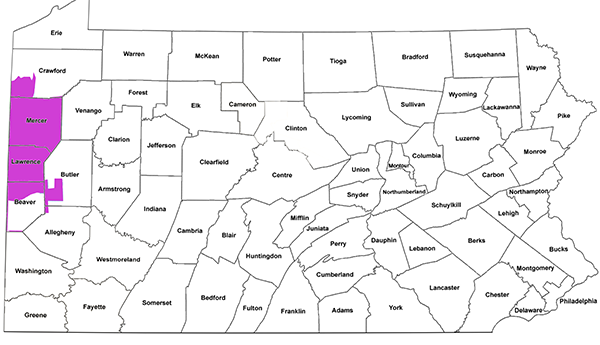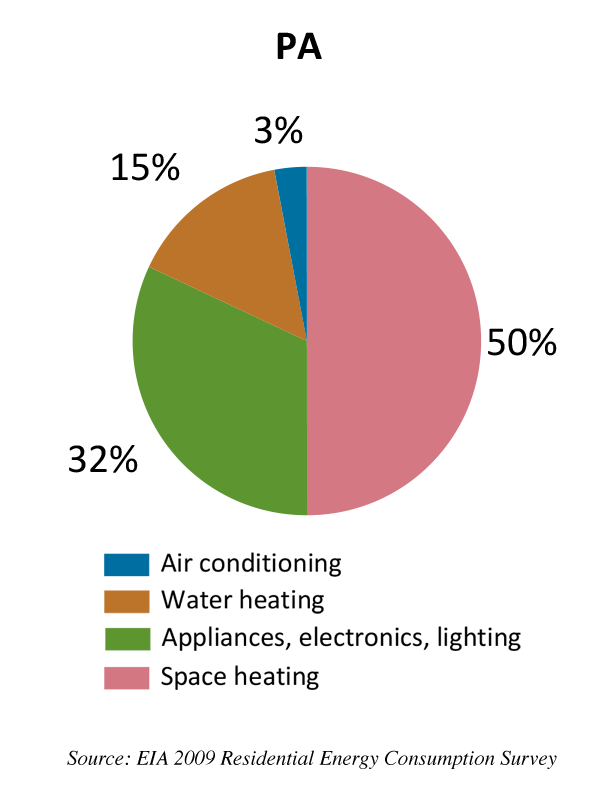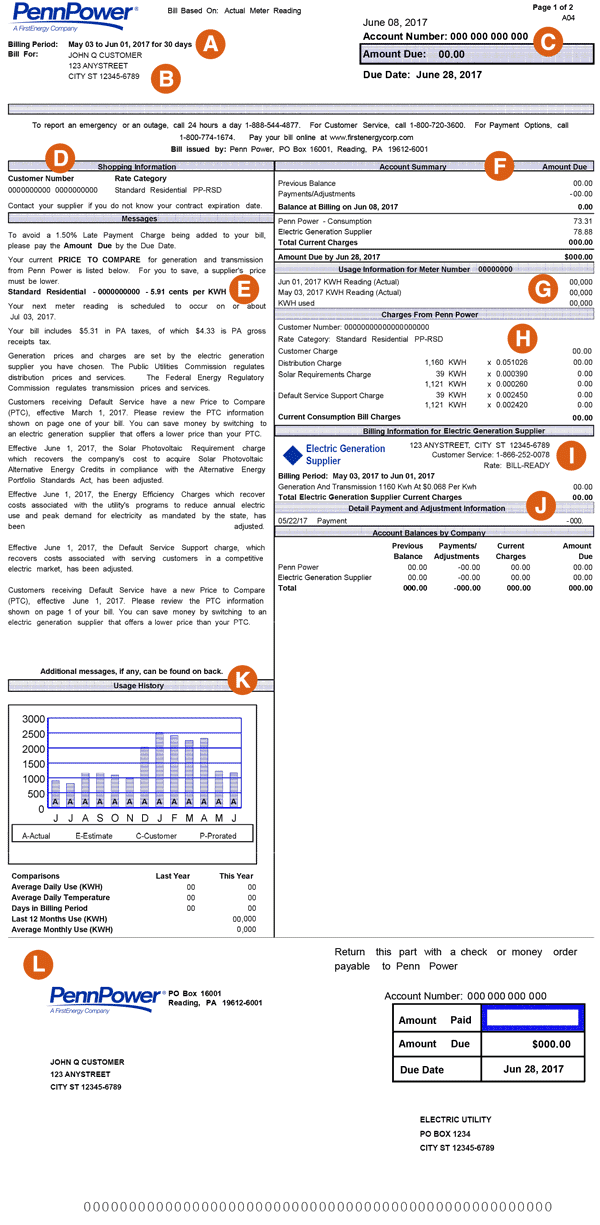Find More Electricity and Natural Gas Plan Options
Switch And Save
Pay Your Bill
Recommended Penn Power Electricity Plans
Price Alert!
The lowest electricity rate in the Penn Power service area is 12.890¢ per kWh. That is 1.7% lower than the Price to Compare of 12.606¢.
Penn Power Service Territory

Penn Power distributes electricity to more than 160,000 customers in some or all of these western Pennsylvania counties:
Penn Power serves these cities:
Compare Penn Power Electricity Rates
Compare alternative supplier electricity rates in the Penn Power service area.
- Enter zip code.
- Select "electricity".
- Choose "residential" or "business".
- Click "Shop for Rates".
In Pennsylvania, electricity utility service territories may overlap in some zip codes. If the tool reports that it has found more than one serving your zip code, don't worry! Just choose your local utility from those listed.
You'll then get to see the listing of all the energy suppliers' plans available in your area, along with rates, term lengths, and links to more detail information.
How to Start New Penn Power Service
Getting set up with Penn Power is easy and convenient. Just visit the Penn Power web site and simply fill in the online Start Service form.
Start requests take at least 2 days to process and First Energy will send you an email confirming your start date.
Customers should call the Penn Power Contact Center if they need their service turned on sooner.
Be ready to supply:
- Service Address: The address where you want your service turned on or switched.
- The start date for electricity service.
- Personal Information: You will need your name, phone number, email address, and your Social Security Number. These will be required.
- Penn Power will do a soft credit check to determine if a deposit is required.
Will I Need to Pay a Deposit?
Credit Rating -- Penn Power has the right to check your credit history and level of credit risk to determine whether a security deposit is necessary. Other factors include whether the customer was previously disconnected or has unpaid energy bills.
TIP -- Be sure to unfreeze your credit. If you have frozen your credit with any of the major credit agencies, you will need to have it temporarily unfrozen before you submit a new service request.
Pay a Deposit -- Penn Power must notify you in writing within 3 business days about the specific reasons why you are required to pay a security deposit. PA law states that deposits cannot be greater than an estimated two months usage.
PA State Laws About Utility Deposits
- Deposits cannot be greater than an estimated two months usage.
- Customers have 21 days to make a payment after the utilty sends them the deposit request notification. However, customers have three months to pay the full deposit.
- Penn Power can hold the deposit for 24 months. If the customer pays their bill in full and on time for 12 consecutive months, the deposit will earn interest.
- Customers have the right to use a guarantor who is a credit-worthy customer with Penn Power and can pay your bills if you fail to do so.
Understand Penn Power Delivery and Supply Charges
In Pennsylvania, residential customers pay for both the cost to deliver their electricity as well as for the amount of electricity supply that they use.
Understand Penn Power PTC Charges
When deregulation began in Pennsylvania, all utilities that wanted to participate in consumer choice had to sell off their generators. However, the PAPUC requires these utilities to provide electricity supply at a default rate to customers in their service territory who don't shop for a retail supplier. As a result, these utilities must purchase their electricity supply for the default rate from generator companies.
The PAPUC oversees Penn Power's default service rates. Penn Power's supply rate represents generation supply costs that are passed without mark up directly through the utility onto their customers. This default supply rate is also called the "Price to Compare" or PTC.
Price to Compare (PTC)
The PTC default rate represents the actual price (both generation and transmission) the utility pays for the electricity. It not only includes the generator company's price for making the electricity but also the cost to transmit it from power stations over high tension power lines to Penn Power's local electrical switch yards. From there, the electricity is distributed throughout the Penn Power local electrical grid for delivery to homes.
In Pennsylvania, First Energy's utilities set PTC rates by holding auctions to line up their electricity supplies. Auctions are held four times a year to cover four delivery periods. Consequently, Penn Power's PTC rates change every March 1, June 1, September 1, and December 1. When the auctions are completed, the PAPUC must approve the prices for both the generation supply and transmission.
For customers, it means these electricity rates can vary seasonally; low some months, higher the next - notably during the summer.
Penn Power Current PTC Residential Rate:
12.606 cents per kWh, expires 4/30/2026
NOTE: There are approximately thirty-five borough-owned public power systems in Pennsylvania. These purchase energy for their local residents. Many prohibit residents from shopping for their own provider. If you live in one of these communities, check with your local government to learn more.
How Much Do Penn Power PTC Charges Cost?
The DOE EIA estimates that the average Pennsylvania residence uses an average of 864 kWh each month. Therefore, an average PTC bill roughly breaks down like this:
| Rate per 864 kWh Used | Monthly Customer Charge | Total | |
| Penn Power PTC Supply Rate | 12.606 cents | 0 | $108.92 |
| Monthly Distribution Charges (excluding riders) | $0.04332 per kWh | $17.94 | $65.37 |
| Total Bill | $174.29 |
Understand Pennsylvania Energy Choice
Pennsylvania electric consumers are free to choose their own competitive retail electricity supplier. These alternative suppliers shop deals with different producers on the wholesale market to offer competitive rates. For that reason, their rates are not controlled by PAPUC the same way that utilities are. This lets retail suppliers to offer competitively priced fixed rate plans for a variety of term lengths.
Though it can seem confusing, shopping electricity plans is an easy process. The trick is finding the one that meets your needs. That's why retail energy suppliers in Pennsylvania offer two types of plans:
Your Energy Usage and Understanding Your Penn Power Bill

While your energy usage habits are unique to you, any Pennsylvania native will tell you that winters can be bitterly cold and summers can be hazy, humid, and hot. While most PA homes rely on natural gas for heating, roughly 1.6 million (29%) of homes in the state use electricity.
Want to learn more about your home energy usage? Penn Power customers can track 24 months of their electric usage plus other relevant information on each monthly bill or by logging on to your Penn Power account.
The best way to cut your electricity bill is to reduce your usage:
Your utility company can provide a wealth of resources and offers programs to help you improve your home's energy performance.
Understand Your Penn Power Bill
Your Penn Power bill contains many details that can be confusing to customers. But there's lots of useful information to help you better understand your usage and rate. Below, we break down the most important items on a sample Penn Power Electric bill.
Penn Power Sample Bill

- A, B, & C: Bill Overview. It includes your address and personal account number with Penn Power, the billing period, the amount due, and the date that the bill is due.
- D & E: Messages and current PTC rate. Here you find important notifications from Penn Power as well as current Price to Compare rate offered by Penn Power.
- F: Account Summary shows the amounts of any unpaid balances, current Penn Power distribution charges, current supply charges, the total bill and the due date.
- G: Meter Summary: This shows the usage information measured by the electric meter at your address.
- H: Charges from Penn Power include the type of rate you are being charged, the monthly customer charge, the distribution charges, and the total.
- I: Charges from Electric Generation Supplier show the name and address of your electricity supplier, their base rate charged, and the total supplier charges due.
- J: Account Balances by Company lays out the amounts that have been paid or are owed to Penn Power and your supplier.
- K: Shows your usage history per bill over the course of the past year to help you compare your energy use over time and understand trends.
- L: Payment Stub. Just detach and return with your payment. It also includes your account number, amount paid, amount due, and the due date.
Compare Penn Power Rates
Penn Power Coupons, Energy Promotions, Discounts, Rebates and Promo Codes
As your local electric utility, Penn Power offers several rebate and energy efficiency programs to help customers reduce their monthly bill by upgrading their home's energy performance. Some programs also offer money-saving incentives while others could make paying your monthly bills much easier during those expensive winter months.
| Program Name | Program Type | Benefit |
| Appliance and HVAC Rebates Program | Energy Efficiency Rebate Program | Pennsylvania residential customers of Penn Power and other FirstEnergy utilities can now take advantage of rebates on the purchase of ENERGY STAR certified appliances and HVAC systems.
|
| Appliance Turn-In Program | Energy Efficiency Rebate Program | Recycle your old working fridge or freezer and get $50. Plus, you save money on your electricity bill.
|
| Energy Efficient New Homes | Energy Efficiency Rebate Program | Pennsylvania Energy Efficient New Homes Program provides financial incentives for construction of more energy-efficient single-family, multifamily and manufactured homes. Entire new homes can also receive the ENERGY STAR certification. Energy efficient homes not only reduce energy costs but also increase comfort. Homes qualified through the FirstEnergy New Homes Program achieve energy efficiency through established, reliable building techniques. |
| Home Energy Analyzer | Energy Efficiency Rebate Program | First Energy's Home Energy Analyzer is a simple, convenient tool you can use to save energy and money. Best of all, it's free. Just register online with your account number and zip code. |
| Residential Energy Audit Program | Energy Efficiency Rebate Program | First Energy customers can sign up for the low cost Home Energy Audit Program. A certifeid energy audiotr will:
|
| Lighting Discounts and Water Heating Rebates | Energy Efficiency Rebate Program | First Energy's customers can take advantage of instant discounts on the purchase of qualified ENERGY STAR certified bulbs. Customers can also receive an instant $500 discount at participating retailers when they purchase a qualified heat pump water heater. |
| Penn Power Payment Arrangements | Bill payment assistance | Penn Power offers payment arrangements to allow residential customers to pay their account balance in monthly installments. These installments are billed along with your current monthly charges and both must be paid on time, in full each month.
|
| WARM Program | Residential Energy Efficiency | Helps eligible Penn Power customers using more than 375 kWh per month a way to reduce their electric bills through home weatherization and conservation. |
| Medical Certificate | Bill payment assistance | This will delay termination of service for up to 30 days if you are eligible for a medical certificate or renewal, and if you or anyone living in your home is seriously ill. A licensed physician, physician's assistant or nurse practitioner must notify Penn Power in writing. |
| LIHEAP Cash and Crisis Grants | Bill payment assistance | LIHEAP usually opens in early November and closes in early April. The program is available to eligible customers whose income is 150% of the Federal Poverty Level or below. |
| Dollar Energy Fund | Bill payment assistance | Penn Power partners with Dollar Energy Fund to provide help to limited-income households.
|
| Penn Power Customer Assistance & Referral Evaluation Service (CARES) program | Bill payment assistance | There are no income guidelines to qualify for the CARES Program. You may qualify for CARES if you:
|
| Pennsylvania Customer Assistance Program (PCAP) | Bill payment assistance | Pennsylvania Customer Assistance Program (PCAP) helps residential customers maintain electric service and eliminate their past-due balance. To apply. Customers will need to supply the following information:
Participants are billed approximately the same amount each month in order to manageably reduce their debt. Apply through the Dollar Energy Fund. |
Read Penn Power Reviews
Penn Power serves a mid-size east-coast regional market segment. For that reason, western Pennsylvania customers can get a good idea of how well it compares to similar sized utilities in similar makrkets. While Penn Power is not accredited with the BBB, it is the top eastern mid-sized utility in J.D. Power's 2021 utility residential customer satisfaction study. The utility also rated well in Escalent's 2021 Utility Trusted Brand & Customer Engagement™: Residential study.
| PA Energy Ratings Score | Better Business Bureau | J.D. Power 2021 Electricity Utility Study | Escalent 2021 Utility Study |
| N/A | Not Accredited | 768of 1000 pts | 708of 1000 pts |
How Do I Get the Cheapest Penn Power Rate?
Shopping for a new Penn Power Customer Choice Plan can seem daunting at first. But, once you understand how it works, it's very easy and straightforward. To begin, you should have these three things with you when you shop for electricity.
- Your current bill. Your past usage per billing period can help you estimate a how much a plan might cost you each month.
- The current Penn Power PTC and expiration date. Knowing the current Penn Power supply price lets you compare rates offered by retail energy suppliers. This way, you can get a better feel for what suppliers are offering, for how long, and if any of their incentives make their price work for your family's need.
- Your Penn Power of Pennsylvania customer account number. This 10 digit number is located on your bill. Having it handy lets you sign up with a retail supplier right away.
Penn Power Shopping Questions
The best way for a PA energy customer to avoid making a bad choice it to ask the right questions. That way, you can learn exactly the information that can save you money. When you shop for electricity service in Pennsylvania, always be sure to ask these important questions:
- Is the rate variable or is it fixed?
- Is the rate competitive with the current Penn Power supply rate?
- How long does the plan contract term run?
- Does the plan's contract term last longer than Penn Power's PTC rate?
- Does the plan include any recurring monthly charges?
- Does the plan have an early cancellation fee?
- Does the supplier offer any customer incentives or rewards programs?
- What happens when the contract expires?
Other Commonly Asked Pennsylvania Electricity Questions:
Who bills me? Penn Power sends a single bill that outlines and adds up your monthly charges.
What are the Terms of Service? In PA, Customer Choice Plans must include Terms of Service that explain and identify specific charges and any fees a customer will face when they sign up for an electricity plan. Not all suppliers have the same terms. That's why all Pennsylvania energy choice customers should read and understand the terms of service and contract summary for any plan they are interested in before they sign on to the plan.
What are early termination fees? Switching retail suppliers before a contract ends can involve paying early termination fees. These can take a big chomp out of your checking account you if choose to switch retail providers before your plan contract ends.
Where can I find more information on my usage? Penn Power customers can view 24 months of their energy usage on their monthly billing statements. This information is also available through your Penn Power online account.
Compare Penn Power Electricity Rates in Your Area
Bill Questions? Electricity Out? Contact Penn Power!
Having problems or interruptions with your Penn Power electricity? Here's the proper people to call.
Penn Power Billing Problems
- First thing to do is contact Penn Power. If you are having trouble paying your monthly bill call Penn Power's Customer Service: 1-800-342-5775. Have your account number ready.
- Need extra time to pay your energy bill? Customers can apply to the Customer Assistance Program (CAP) by calling Customer Service or by applying on-line.
- Residential Customers aged sixty (60) years of age or older or a residential customer receiving Social Security or an equivalent monthly pension payment can request to extend the due date of such customer's bill from 20 days to 30 days.
The PAPUC requires all PA public utilities to offer Budget Billing. This typically involves taking your annual electricity costs and averaging them out over the cost of the year. This ensures that customers aren't hit by suddenly high bills at peak times. Call Customer Service or apply on-line.
Penn Power Emergencies and Outages
All power lines are extremely dangerous! Never attempt to move a downed power line by yourself. Call 911 and then notifiy Penn Power.
- Report safety hazards involving power lines immediately to Penn Power at 1-800-342-5775.
- You can also report downed lines or outages at Penn Power's website.
- Check Penn Power's current electric outages as they are being repaired.
Penn Power Service Area Providers
| Company | Rating | Phone |
|---|---|---|
| Constellation | (4.2/5) |
866-773-8761 |
| Frontier Utilities | (3.8/5) |
866-775-9922 |
| Energy Harbor | (3.6/5) |
866-632-6308 |
| APG&E | (3.4/5) |
866-751-6415 |
| Santanna Energy Services | (3.1/5) |
866-607-2101 |
| XOOM Energy | (3/5) |
|
| Think Energy | (3/5) |
866-763-5041 |
| American Power & Gas | (2.9/5) |
866-763-3786 |
| Provision Power & Gas | (2.6/5) |
866-929-2842 |
| Direct Energy | (2.5/5) |
866-646-0311 |
| NRG Home | (2.4/5) |
|
| CleanSky Energy | (2.3/5) |
866-751-2986 |
| Major Energy | (2.1/5) |
866-756-8272 |
| Green Mountain Energy | (2.1/5) |
|
| Symmetry Energy Solutions | (2/5) |
888-549-1087 |
| National Gas & Electric | (2/5) |
|
| PAG&E | (2/5) |
|
| NextEra Energy Services | (2/5) |
855-639-8091 |
| Public Power | (1.4/5) |
866-752-4690 |
| Verde Energy | (1.2/5) |
866-953-8160 |
| Spring Power & Gas | (0/5) |
866-759-4976 |
| 21 results | ||



